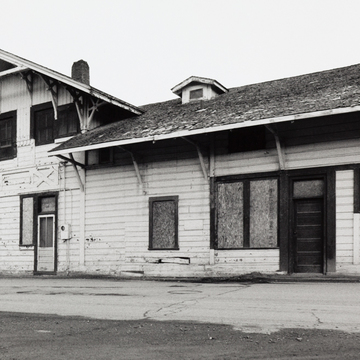The original L-shaped depot of 1889 at the east end of Main Street is one of the more architecturally significant depots in the state, built in the popular Stick Style seen in many nineteenth-century depots throughout the United States. Although the building is dilapidated, it is largely unaltered and retains much of its decorative stickwork. The main section of the building has two stories, with a one-story wing projecting along the tracks to the southwest. Board-and-batten siding covers the gable ends; drop siding clads the rest of the building, embellished with vertical, horizontal, and diagonal flat stickwork. A three-sided bay window marking the ticket office projects from the two-story section toward the tracks. In addition to the ticket office, the first floor includes a waiting room and baggage room; offices were on the second floor. In 1917 Southern Pacific expanded the baggage and office areas. Though it is a focal point of Lovelock's Main Street, the building is currently vacant.
You are here
Lovelock Depot
1889, Central Pacific Railroad. 1917, Southern Pacific Railroad. Northeast corner of Main St. and W. Broadway
If SAH Archipedia has been useful to you, please consider supporting it.
SAH Archipedia tells the story of the United States through its buildings, landscapes, and cities. This freely available resource empowers the public with authoritative knowledge that deepens their understanding and appreciation of the built environment. But the Society of Architectural Historians, which created SAH Archipedia with University of Virginia Press, needs your support to maintain the high-caliber research, writing, photography, cartography, editing, design, and programming that make SAH Archipedia a trusted online resource available to all who value the history of place, heritage tourism, and learning.






